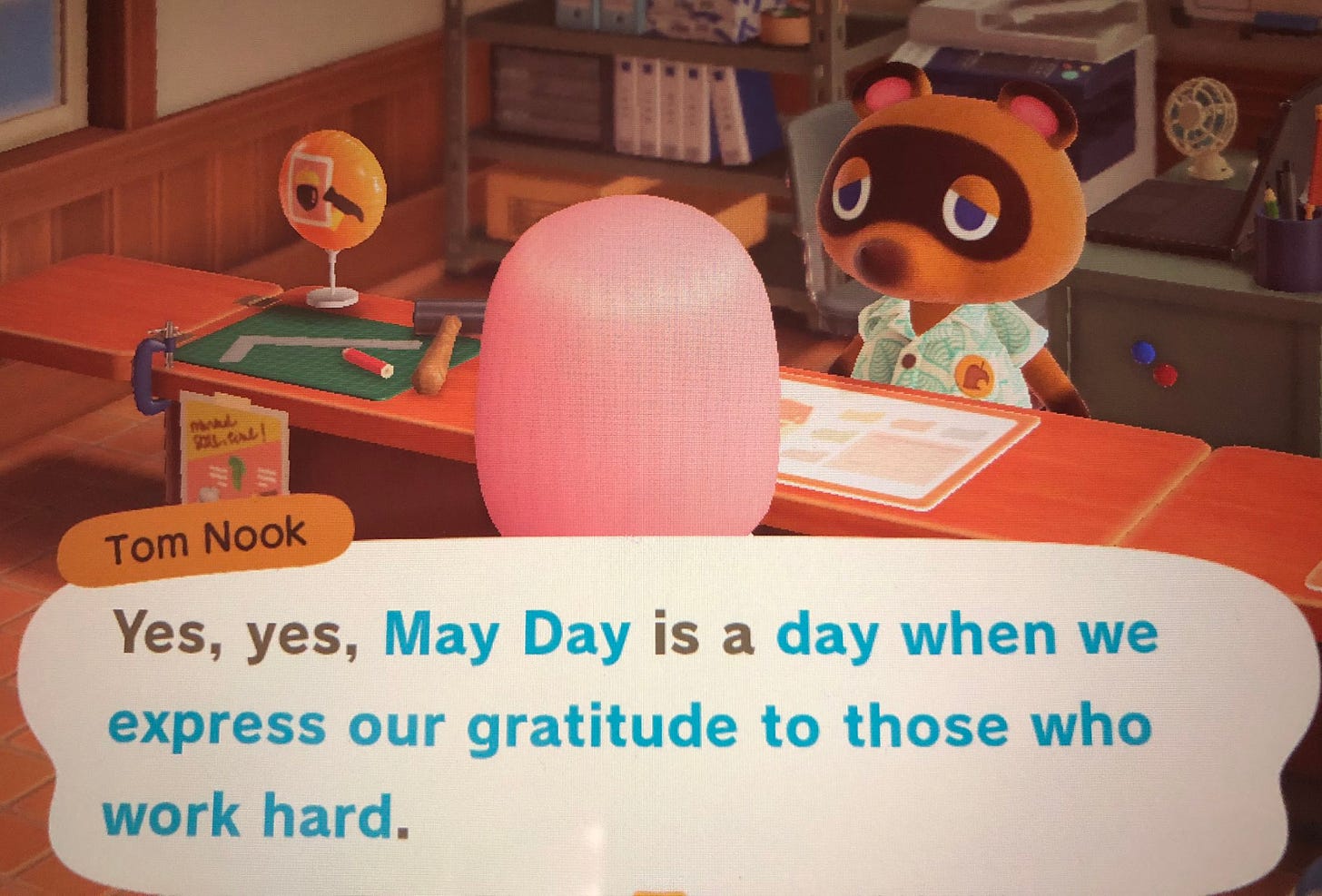Cheated Gaming Moment
Animal Crossing, Esports Cheating, Blessing Looms, ICEBUCKET, Luckin Coffee, and Twitter Randos
The Bank of Nook

I haven’t had a reason to write about Nintendo’s Animal Crossing: New Horizons, because I typically only write about video games when they are being used to launder money or steal from state governments.
I have not played the game or its predecessor, but I do have a Twitter account, and Crossing Content makes up at least 30% of my timeline on any given day. The game is singlehandedly driving sales of Nintendo’s consoles, and is shaping up to be the biggest hit of the pandemic. Jokes about it being a “job simulator” aside, the game appears to also be an…economy…simulator? I think? The Financial Times has been having a bit of fun reporting on it:
The total interest available on any amount of savings has now been capped at 9,999 bells — the in-game currency that can be bought online at a rate of about $1 per 1.9m bells.
The abrupt policy shift, imposed by an obligatory software update on April 23, provoked a stream of online fury that a once-solid stream of income had been reduced to a trickle with the stroke of a raccoon banker’s pen.
“I’m never going to financially recover from this,” one player wrote on a Reddit forum. “Island recession incoming,” said another.
Why is Nintendo simulating central banking policy in its game about farming on islands? What is going on?
The shock Bank of Nook rate cut mirrors efforts by monetary authorities around the world to ease the effects of coronavirus by cutting rates and lowering longer-term borrowing costs through vast bond-buying programmes.
Awkward metaphors aside, why did the Bank of Nook take such drastic austerity measures?
It did not take long, however, for players to spot that they could defraud the game’s bank by depositing large sums in saving accounts and then “time travelling” into the future by tweaking the console’s internal clock. The bank duly pays decades of compounded interest, making rapid bell millionaires.
Bank fraud! In a video game! I love it. Is console clock hacking the LIBOR scandal of Animal Crossing? It’s certainly sidelined interest rate traders and re-focused profit motives where they belong, in stock speculation:
As many users pointed out online, the much lower interest rate means that the most effective way of making money is now to gamble on the game’s internal “stalk” market — a bourse in which the only commodity is turnips, sold to investors during a single session on Sundays. The root vegetables rot and their value drops to zero after a week.
I applaud whoever designed what is apparently a very complex financial system in a game about having a farm on an island. At least, I think that’s what the game is about. I still have no idea.
Out Foxed
The more I learn about Animal Crossing, the more sad I am that it is impossible to buy a Nintendo Switch to play it. No, really, I’m not kidding:
Like lots of money-making opportunities in online shopping, many of these resellers aren't just stumbling upon their in-demand product of choice. Instead, developers are creating dedicated tools to automatically buy Switches from stores when they come back in stock, and before others get a chance to.
Sniping retail products with bots is not new, and I’ve written about sneakerheads using them. It still sucks for people who just want to do some bank fraud in a video game during the pandemic.
Speaking of fraud in Animal Crossing, did you know there is also art forging going on in the game?
Redd offers dozens of great works of art at bargain prices. But, there is a catch: not all the artwork Redd sells is real. In fact, he will often have fakes that are virtually worthless once a player purchases them, as Blathers cannot include forged pieces in the museum.
I am considering downloading a bot to order myself a Switch, because this is delightful. Imagining the video game artists at Nintendo whose job it was to not only recreate famous artwork in pixels, but to also make subtle fakes of the artwork. All so a shady art dealer in the game can defraud its players.
As we have seen, forged art shows up quite often in museums, so why should video game museums be any different? I hope this “Blathers” character has insurance.
Cheating at Games
Let’s keep talking about video games! An article this week in Bloomberg explores the dark underbelly of esports, or playing video games for money:
As money pours into the nascent industry, the temptation for players to break the rules is growing. Corruption is rife, with gamers caught cheating and illegal betting syndicates trying to fix matches.
Illegal video game betting syndicates? Sign me up! Esports has become wildly popular in many parts of the world, and with popularity has come the betting markets. Professional gamers are making real money now, with some tournament prizes in the millions of dollars. Big brands are sponsoring teams and events. However, unlike a bike race or football game, most of the action takes place in front of a computer, in a small room. The industry has been scrambling to enact measures to prevent cheating:
ESIC has been teaming up with betting firms and authorities to provide the kind of data that helped Australian police arrest the six suspects back in August. It is educating players about cheating and illegal betting, and has set up drug testing at major tournaments to detect doping. This often involves the use of substances that cut down reaction time or improve concentration, such as Adderall
This is all good, and makes sense. Many of the players are minors, and a global sport that happens primarily online is going to be difficult to police for illegal betting and cheating.
The situation reminds me of match fixing in tennis, which has been going on for a long time, and has proven difficult to stamp out. If they can’t stop a handful of tennis players from throwing games, I’m not sure how they expect to stop tens of thousands of gamers from doing it. I mean, cycling has been dominated by dopers for decades, and people still watch it! Let’s just try to keep the kids out of the hands of illegal syndicates, and let them play Fortnite.

Blessing Looms
I read this article in The Economic Times about how “blessing loom” scams have started to crop up in India during the pandemic. On its face, the scheme is pretty simple - you pay $100 to enter a “group” and they tell you to recruit eight other people at $100 each, at which point they will pay you $800. It is…not a very sophisticated Ponzi, but people keep falling for it? Complex wrote an explainer on it, and notes that it seems to be cropping up again in places like Utah, as people try to find ways to make money in a pandemic.
What I can’t figure out, though, is why the articles about blessing looms reference a guy named Derek Loom, who allegedly made over $10 million dollars by inventing the scheme on Facebook, and was either arrested…or…not? I can’t seem to find anything that actually confirms this, despite multiple sites claiming it as fact?
If you are able to use internet searches better than I am, or have inside info on the mysterious character named Derek Loom, please let me know. I have questions.
Luckless
Chinese coffee company Luckin had a bad April. On the 2nd, they disclosed that a lot of their 2019 revenues were fabricated which - I am not a financial analyst - seems bad. Their share price went from $25 to $5 and investors lost around $5 billion in value, before trading in the stock was halted entirely. Luckin is under investigation by Chinese authorities, as this recent WSJ piece details. What interested me about the story was this bit:
While the company is listed in the U.S., its holding company is incorporated in the Cayman Islands and most of its operations are in China.
For years, the Securities and Exchange Commission and the Public Company Accounting Oversight Board have been unable to inspect audits of Chinese companies whose securities trade on U.S. stock exchanges. That has prevented them from getting information needed to bring enforcement actions against companies that may have engaged in securities fraud.
So, if I have this right, US stock exchanges list stocks that US regulators have no way to investigate or audit? What?
In the wake of Luckin’s accounting scandal and the disclosure of inaccurate financial statements by another U.S.-listed Chinese company this month, the SEC last week warned investors about the “significant risks” of investing in companies from China and other emerging markets. For such companies, “there is substantially greater risk that disclosures will be incomplete or misleading and, in the event of investor harm, substantially less access to recourse, in comparison to U.S. domestic companies,” the SEC said.
I…what? It turns out that the SEC does not set the listing requirements for stocks on the exchanges. Each exchange has their own requirements, as the SEC’s website explains:
Before a company can begin trading on an exchange, it must meet certain initial requirements or "listing standards." The various exchanges set their own standards for listing and continuing to trade a stock. The SEC does not set listing standards.
Huh! Okay. So in this case, the NASDAQ exchange listed Luckin Coffee, a Cayman Islands company with Chinese operations, and opaque financials. Does NASDAQ have any liability here for the $5 billion that investors on its exchange lost? No, of course it does not. Amusingly, the first search result for “NASDAQ liability Luckin” took me to an article published on NASDAQ’s website by an analyst about how Luckin had great long term growth potential, written two weeks before the fraud scandal. Whoops.
Luckin has an auditor - EY, the parent of Ernst & Young in the US. However, they used their Chinese subsidiary - each country’s firm is essentially a franchise - which was not subject to any US oversight, despite the company being listed on a US stock exchange. EY China caught the fraud while doing their audit of Luckin’s 2019 financials. The whole thing has a bit of a “take our word for it” feel to me, which is not what I thought publicly listed stocks were supposed to feel like.
NASDAQ is not the only offender, according to the Journal:
On April 7, New York-listed TAL Education Group, which provides tutoring services to students in China, said it suspected an employee had forged contracts in a business unit that contributed to 3% to 4% of the company’s estimated revenues.
So the stock exchanges are allowed to list companies whose business practices and financial stability they cannot possibly vouch for, and investors can get wiped out if the company turns out to be doing fraud? This does not seem like a particularly well-thought-out system. Has the stock market been like this the whole time? I know all investing is “at your own risk” but when the exchanges give foreign companies their stamp of approval, does everyone know that is apparently meaningless?
ICEBUCKET Challenge
An article in ZDNet details research from a cybersecurity firm that uncovered a massive ad fraud operation, using some clever code to spoof smart TV devices:
White Ops researchers say that the ICEBUCKET group has discovered weaknesses in the SSAI server communications mechanism.
For the past months, the gang has been using this weakness to connect to SSAI servers and request ads to show on non-existing devices.
Basically, this group created millions of smart devices out of thin air, then used those fake devices to send requests for ads to display, which the ICEBUCKET group profited from. The craziest part of the story is the sheer scale of the operation:
At its peak in January, White Ops says the ICEBUCKET gang generated around 1.9 billion ad requests to SSAI servers per day.
2 billion ads per day, served on non-existent devices. And it took a few months for anyone to notice. According to eMarketer, connected TVs are the “priciest” of the in-stream ads, with costs as much as $28 per thousand ads shown. That’s a cool $5 million in fake ads, by my math. Not too shabby! I assume this is where most of Quibi’s advertising budget went.
After One Tweet To President Trump, This Man Got $69 Million From New York For Ventilators
Yup:
Not a single ventilator ever arrived.
A state official, speaking on background because he was not authorized to publicly discuss the terms of the deal, said New York entered into the contract with Oren-Pines at the direct recommendation of the White House coronavirus task force.
In other news, New York’s governor was on television this weekend denigrating the homeless his government can’t seem to provide shelter for, while they cut $69 million dollar checks to randos from Twitter.
Short Cons
Buzzfeed News - “Roughly a billion emails promoted overpriced face masks with misleading claims. The man selling them says it isn't his fault.”
NY Times - “Live Nation Entertainment, the biggest power in the concert industry, closed a gap in its ticket refund policy on Friday, after weeks of criticism that the company, and its Ticketmaster subsidiary, were not returning hundreds of millions of dollars that fans had spent on concerts postponed by the pandemic.”
Tech Crunch - “Amazon is piloting a new system aimed at validating the identify of third-party sellers over video conferencing, the company announced on Sunday. The technology is a part of a series of seller-verification processes that Amazon uses to combat fraud on its platform”

Happy May Day! Tips, comments, and blessings to scammerdarkly@gmail.com
